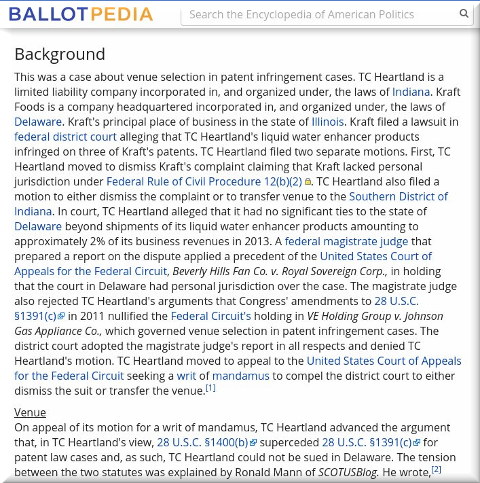
Reference: TC Heartland v Kraft
Summary: The latest activities inside and outside the courts show that TC Heartland became a considerable barrier to trolling and aggressive tactics of trolls have shifted to (or been aimed at) their critics
THE USPTO's evolving attitude towards software patents (post-Alice) is noteworthy. Section 101 is making a real difference. After TC Heartland (covered here many times before, e.g. [1, 2]) companies try to find 'artistic' ways to push patent litigation to crooked court districts. They often rely on software patents granted before Alice; that's where PTAB comes handy.
The other day we saw
this docket report about an attempt to bypass
TC Heartland and shift lawsuit venue based on the location of a
rented server (many servers are located in Texas for various business reasons). To quote:
The court granted defendant's alternative motion to transfer for improper venue because a rented server did not qualify as defendant's regular and established place of business.
This won't work.
TC Heartland was quite clear about this. When companies (or trolls) rely on outdated and low-quality software patents it's not surprising that they try moving litigation to Texas. For instance, this
new press release says that some company "expanded its core merchant processing services to include enterprise-grade, patent-protected software and intellectual property..."
Well, "patent-protected software" means not much after
Alice; copyrights do, but not patents...
It seems as though their only hope now is judges like Gilstrap, who famously disregards the Supreme Court, not just on
Alice but also
TC Heartland.
People
recall (citing
this outline) how Michelle Lee got bullied out of her job by the patent microcosm and the patent trolls' lobby, adding the reference to
TC Heartland and alluding to trolls as "NPEs" while mentioning China. To quote: "2017 has been a year of headlines. From Michelle Lee stepping down as the Director of USPTO to the law changing decision in TC Heartland. From NPEs divesting their interests in diverse business models to China’s relatively new IP Priorities, and lot more"
Well, "China’s relatively new IP Priorities" are a recipe for patent trolling. In China, as it turns out, it's now Shenzhen (as well as Beijing and Shanghai) that facilitates the litigation 'business' (patent trolls). As
Chinese media put it the other day:
Southern Chinese city of Shenzhen Tuesday set up a financial court and an intellectual property (IP) court.
[...]
In 2016, courts in Shenzhen adjudicated on 14,887 IP cases of first instance, or one 10th of the nation's total. In the first eleven months, Shenzhen courts handled 23,639 financial dispute cases of first instance, twice the number in the same period last year.
Maybe they just wish to become the next Texas. Good luck with that. It's self-harming.
In the US, by contrast, trolls are a dying breed. William Bozeman, for example, was mentioned by
the Conservative media the other day. It's in relation to his patent battle against the Federal Reserve System, which paints Bozeman as nothing but a troll. Here are some portions from the
Washington Times:
William Bozeman, an independent inventor with a colorful history, says he used to have a good relationship with the Federal Reserve System and even helped improve its fraud detection efforts.
[...]
The Fed described Mr. Bozeman as an opportunist, trying to demand money for technology he didn’t invent.
Mr. Bozeman said he is being bullied by the secretive central bank and that the Fed is trying to run up his legal bills by filing all the complaints in an effort to make him go away.
If he never implemented this thing on his own, then it makes him an opportunist. There are various companies out there, especially in Texas area, which do nothing but litigation. They aren't doing well.
Dominion Harbor is a patent troll which felt so hurt by the Electronic Frontier Foundation (EFF) that earlier this year it ran an anti-EFF
series (not just a single article). Nowadays it promotes
other parasites and
says: "We're not running out of good ideas. We just need to get better at implementing them..."
Dominion Harbor never implemented anything whatsoever, so this statement is laughable. Patent trolls feel the pinch and publicly attack the Electronic Frontier Foundation (EFF) as well as yours truly (they did a whole podcast about me, in which they lied endlessly about me). But don't worry about the EFF; they're doing just fine. They've just done
an annual roundup of their activity and wrote:
This year was once again active in terms of patent law and policy. Throughout it all, EFF worked to protect end user and innovator rights. We pushed for a rule that would end the Eastern District of Texas’ unwarranted dominance as a forum for patent litigation. We also defended processes at the Patent Office that give it the opportunity to correct mistakes (many, many mistakes) made in issuing patents. And we fought to prevent new patent owner tactics that would increase consumer costs.
We are very supportive of the work the EFF does on the patent front these days. We habitually see "Electronic Frontier Foundation" in publications like
VentureBeat and
TechDirt (reposted again some days ago [
1,
2]) and the public sentiment too is changing. If it carries on like this, not only will the Supreme Court acknowledge that patent trolls are a problem (some Justices already call them "trolls") but will also weed them out in future rulings.
As a closing word, I'd like to disclose that I received a nasty letter from a highly notorious patent troll. I might publish it some time in the near future. As
Ray Niro has already demonstrated, heavy-duty trolls have no qualm about attacking their critics, even if these critics are bloggers. They drag the critics to court. The EFF has been sued quite a few times by now for merely criticising particular patents.
⬆

